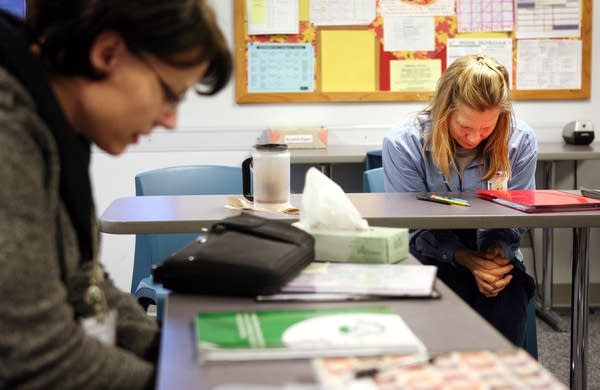Christian-based program helps keep inmates from re-offending

A controversial program using Christian teachings to try turn around the lives of hundreds of Minnesota prison inmates is working, according to a new report from the Department of Corrections.
Participants in the InnerChange Freedom Initiative, which operates at the Minnesota women's prison in Shakopee and at a men's prison in Lino Lakes, are more likely than others to stay out of prison after their release, according to the report.
State researchers followed more than 730 former inmates released between 2003 and 2009, and found that those who were part of the program reduced their risk of returning by as much as 40 percent.
State officials are hailing the program as a cost-effective success. They say it is a good deal because the state provides the space and the program pays everything else.
Create a More Connected Minnesota
MPR News is your trusted resource for the news you need. With your support, MPR News brings accessible, courageous journalism and authentic conversation to everyone - free of paywalls and barriers. Your gift makes a difference.
"There is no cost to the taxpayers of the state of Minnesota," said David Crist, deputy commissioner of the Minnesota Department of Corrections. "Yet it does reduce recidivism. And when offenders are not out there committing new crimes, the public is more safe. That's a very practical reason for working with IFI."
Each prison has a dedicated area where InnerChange inmates live together, eat together, and pray together. The programs have a combined 200 inmates who take daily classes based on Christian principles.
The inmates' numbers are nearly matched by volunteers: about 150 Christians from across the state serve as mentors to InnerChange participants. The volunteers provide emotional support and help inmates leaving prison find housing and jobs — two obstacles that, unless overcome, can end up sending other offenders back to prison.

Crist said state officials created a secular program modeled in part on InnerChange's mentoring component. But he said faith might be a critical element in making mentoring work.
"The religious aspect of the program provides a calling for the volunteers to be mentors that you don't often get from other volunteers," he said.
Most program participants don't focus on why InnerChange works. Most — like Coty Martinez — are simply grateful it does.
Martinez was convicted as a teenager as an accessory to murder. When she heard about InnerChange, she applied and was accepted.
"I think I wanted it so bad that I was willing to do whatever it took," she said. "Whether it be get up early, whether it be stay up late, or read scripture or whatever it was, I was just ready to do it."
Now 33, Martinez said she has a new feeling of purpose and self-respect. But it's still hard for her to imagine maintaining that outside of prison when she is released in 15 years.
"I think for me it's going to be such a long span of time that things are going to be different, just because of time," she said.

How the program can accept a prisoner who has years left on her sentence is a big sticking point for critics of InnerChange.
"The program was supposed to be targeted for people who had a short period of time before release," said Steve Hokonson, a former chaplains supervisor at Lino Lakes prison.
The state first introduced InnerChange there in 2006.
The Corrections Department says about 10 percent of InnerChange participants at Shakopee prison have a decade or more left in their prison term. About 4 percent in the program at Lino Lakes have life sentences.
Hokonson, who is retired, thinks the program targets vulnerable adults for conversion to Christianity.
"If that conversion purpose is primary, they don't care if they're going to get out or not," he said. --
Critics say the program creates a separate class of inmates who receive coveted benefits. Among those critics is Kristine Holmgren, who was a chaplain at Shakopee when InnerChange arrived.

"I already had women coming into my office and begging to get into this program, because they already knew that they were going to have resources that were not available to the rest of the women in the facility," she said.
Holmgren says she was fired because of her objections to the program. She sued the state and received a $227,500 settlement.
Inner Change takes just about everyone who applies, without regard to religion, according to Jim Liske, CEO of Virginia-based Prison Fellowship — the parent organization for the InnerChange Freedom Initiative.
Liske said participants of non-Christian faiths are given time, upon request, with a leader of their religion. He said that shows InnerChange isn't out to convert participants.
"We're simply proposing that the following of Jesus is a choice that an individual should look at," Liske said. "If individuals feel as though it is a proper and right choice for them to become followers of Jesus, then that's wonderful. But there is no coercion within the program to do that, nor are they disqualified if they don't do that."
Liske said he believes inmates have potential, even if that potential is going to be lived out inside the walls of a prison.
